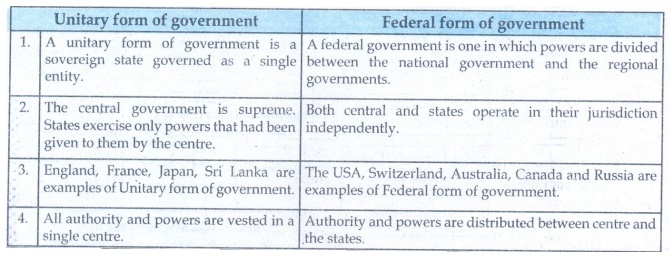Forms of Government | Civics | Social Science - Distinguish between | 9th Social Science : Civics: Forms of Government
Chapter: 9th Social Science : Civics: Forms of Government
Distinguish between
Forms of Government
III. Distinguish between
1. Unitary and federal forms of
government.

Unitary form of
government
1. A unitary form of government is a sovereign state governed as
a single entity.
2. The central government is supreme. States exercise only
powers that had been given to them by the centre.
3. England, France, Japan, Sri Lanka are examples of Unitary
form of government.
4. All authority and powers are vested in a single centre.
Federal form of
government
1. A federal government is one in which powers are divided
between the national government and the regional governments.
2. Both central and states operate in their jurisdiction
independently.
3. The USA, Switzerland, Australia, Canada and Russia are
examples of Federal form of government.
4. Authority and powers are distributed between centre and the
states.
2. Parliamentary and Presidential
forms of government.

Parliamentary form
of government
1. In the Parliamentary system of government the executive is
responsible to the legislature for its policies and acts.
2. The Parliamentary form of government is also known as Cabinet
government
3. Parliamentary form of government is prevalent in Britain,
Japan, Canada and India.
Presidential form
of government
1. In the Presidential form of government the executive is not
responsible to the legislature.
2. The Presidential form of government is also known as
non-responsible system of government.
3. The presidential form of government is prevalent in USA,
Brazil, Russia and Sri Lanka.
Related Topics